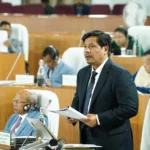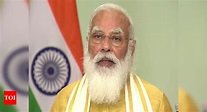The current worldwide health emergency has propelled traditional medicine into the spotlight, with numerous individuals seeking alternative treatments to enhance their immune systems and enhance their general well-being. Ayurveda, the ancient Indian system of medicine, has been gaining popularity worldwide for its holistic approach to health and wellness. In a recent address, Indian Prime Minister Narendra Modi emphasized the potential of Ayurveda to become a global phenomenon, citing its time-tested principles and its ability to address the root causes of diseases.
Ayurveda, which translates to “the science of life,” is a comprehensive system of medicine that has been practiced in India for thousands of years. It is based on the belief that the body is made up of three doshas, or energies, called Vata, Pitta, and Kapha, and that maintaining a balance of these energies is essential for good health. Ayurveda uses a combination of diet, lifestyle changes, and herbal remedies to prevent and treat diseases.
The popularity of Ayurveda has been growing steadily in recent years, with more people turning to this ancient system of medicine to address a wide range of health issues. Ayurvedic treatments, such as Panchakarma, a detoxification and rejuvenation therapy, and Shirodhara, a therapy that involves pouring warm oil over the forehead, have become increasingly popular in the West.
One of the reasons for the growing popularity of Ayurveda is its focus on prevention and holistic health. Unlike Western medicine, which often focuses on treating symptoms, Ayurveda aims to address the root causes of diseases and promote overall wellness. This approach resonates with many people who are looking for natural and sustainable ways to improve their health.
Another factor driving the popularity of Ayurveda is its emphasis on personalized medicine. Ayurvedic practitioners take into account a person’s unique constitution, or Prakriti when designing a treatment plan. This personalized approach is seen as more effective and less invasive than the one-size-fits-all approach of Western medicine.
In his address, Prime Minister Modi highlighted the potential of Ayurveda to become a global phenomenon, citing its time-tested principles and its ability to address the root causes of diseases. He also emphasized the need for more research and development in the field of Ayurveda, as well as the importance of creating a regulatory framework to ensure the quality and safety of Ayurvedic products.
The Indian government has been taking steps to promote Ayurveda on the global stage, including organizing international conferences and exhibitions to showcase Ayurvedic products and treatments. The government has also established the Ministry of AYUSH (Ayurveda, Yoga & Naturopathy, Unani, Siddha, and Homoeopathy) to promote traditional Indian systems of medicine.
The ongoing global health crisis has underscored the significance of traditional medicine, prompting a surge in interest in alternative therapies for enhancing immune systems and overall well-being. Ayurveda, the age-old Indian healthcare system, is gaining global traction for its holistic approach to health and healing. Prime Minister Modi’s recent address highlights the potential of Ayurveda to become a global phenomenon and underscores the need for more research and development in the field.









